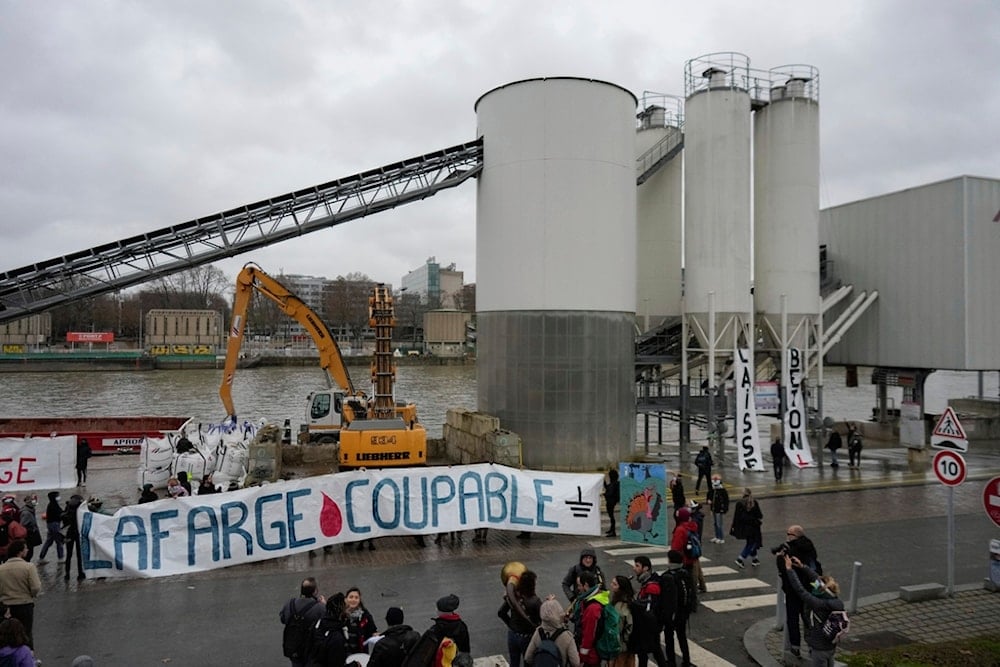Lafarge's dealings with ISIS may reshape corp. accountability: Report
Lafarge's subsidiary in Syria made payments to IS in exchange for protection and approval to continue producing and selling cement.
-

Activists of the environmental group Extinction Rebellion hold a banner reading "Lafarge guilty" outside the Cemex cement plant sits in Paris, Sunday, Dec. 10, 2023. (AP)
A report published by The Guardian on Tuesday revealed the extent of Lafarge SA's involvement in funding the terrorist group Islamic State (IS) to keep its Syrian cement factory running in the early years of the war.
According to the report, between 2013 and 2014, Lafarge, then the world's largest cement conglomerate, paid approximately $6 million to IS and other terror groups, treating them as strategic partners in order to maintain operations in Syria.
Lafarge's subsidiary in Syria made payments to IS in exchange for protection and approval to continue producing and selling cement. The company even purchased raw materials from IS-approved vendors and supplied the group with cement, ensuring that IS could eliminate competition from Turkish cement imports.
This arrangement allowed Lafarge to continue operating, even as bombs and gunfire ravaged the region and local employees were kidnapped.
Read more: Syrian military statement: US occupation cannot persist
The Guardian's report details how Lafarge executives, both in Syria and at the company's headquarters in Paris, were fully aware of their actions, taking deliberate steps to conceal the company's relationship with IS.
Emails between executives reveal instructions to avoid using the Lafarge name on documents related to dealings with IS, fearing the consequences of being linked to the terrorist group.
It was also revealed that Jean-Claude Veillard, Lafarge’s security director, met with French secret services at least 33 times between 2012 and 2014. These meetings suggest that the French government may have been aware of Lafarge’s actions in Syria, as French intelligence reportedly sought information about the Syrian government during this period. Veillard’s role has drawn attention in the ongoing French legal case.
Jean-Claude Veillard, ex candidat FN en 2014, était en charge de mener les négociations entre Lafarge et Daesh pour permettre au cimentier de continuer ses activités. pic.twitter.com/gsQ9tOUEBG
— ONED (@ONextdroite) April 18, 2022
Lafarge's relationship with IS came to light when the US Department of Justice filed criminal charges, accusing the company of conspiring to provide material support to a terrorist organization.
In 2022, Lafarge pleaded guilty and was fined $778 million, making it the first company to face criminal prosecution on such charges in the US.
This fine, however, has opened the door to further legal battles. Victims of IS, including Yazidis and others who were subjected to horrific violence under IS rule, are now suing Lafarge in civil cases.
Read more: Lafarge to plead guilty to funding ISIS, pay $700m fine
Lafarge is also facing a criminal case in France, where former Syrian employees and human rights groups have accused the company of complicity in crimes against humanity.
If Lafarge is convicted, it could set a precedent for holding corporations accountable for their role in perpetuating violence and conflict in war zones.
The French case has been tied up in legal appeals since 2016, but it has garnered significant attention due to its potential to reshape how corporations are prosecuted for complicity in war crimes.

 3 Min Read
3 Min Read








